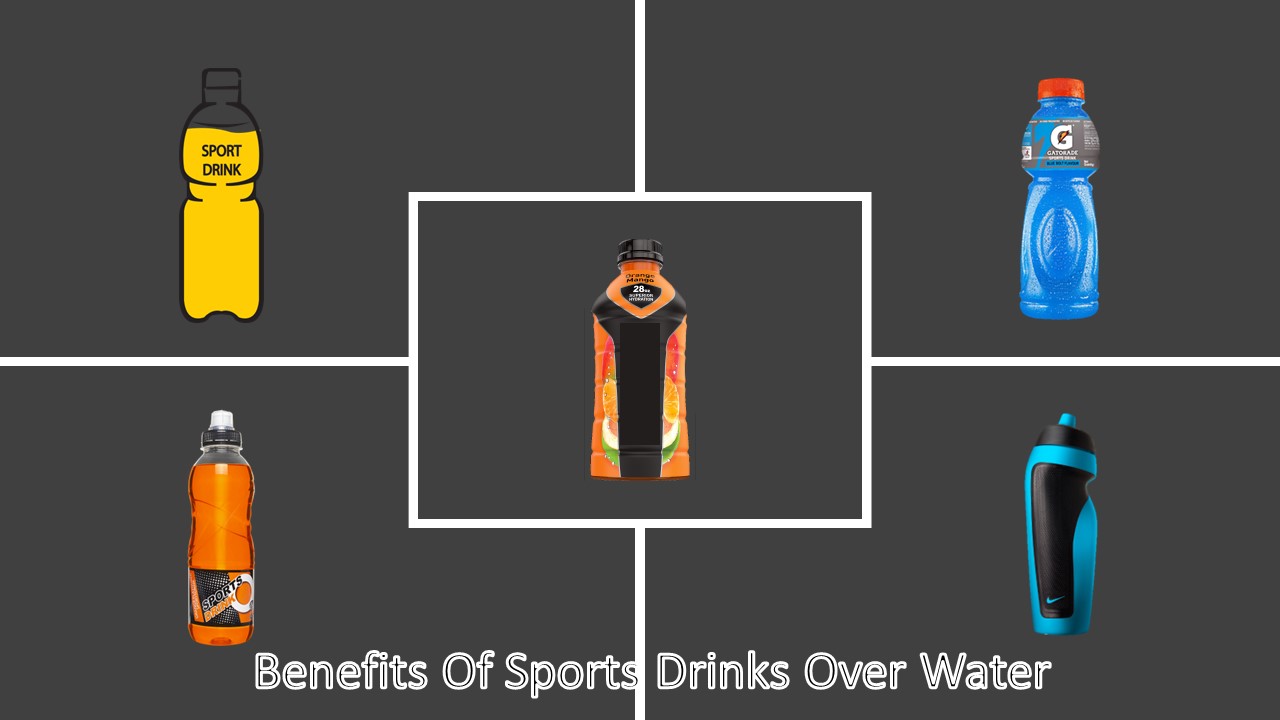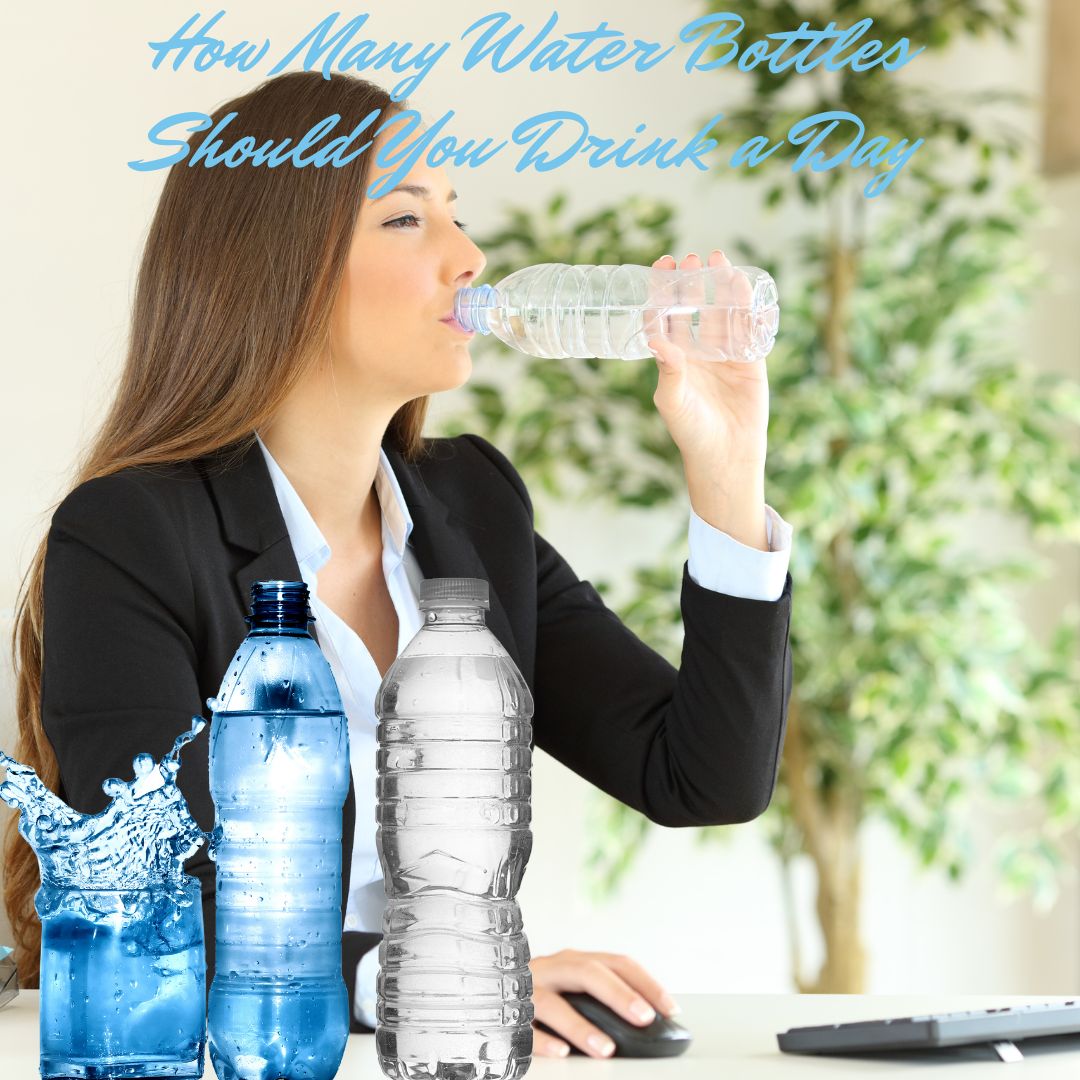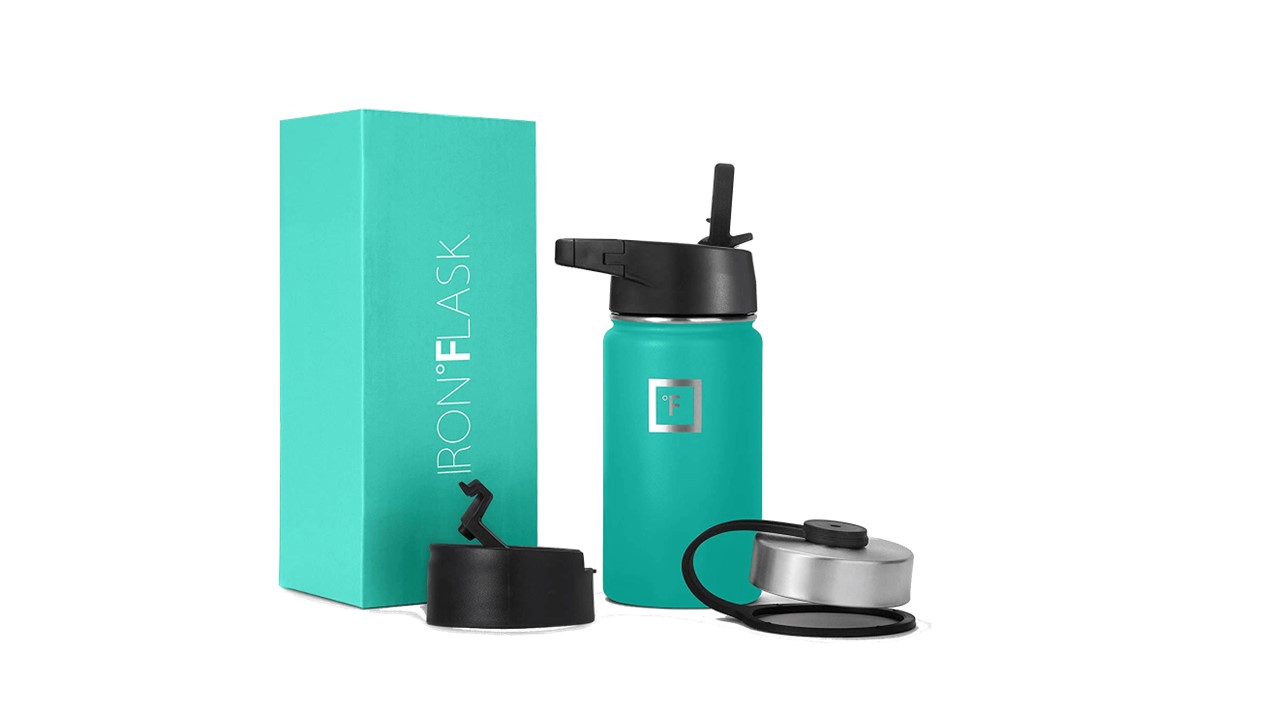Sports Drinks Vs Water Hydration
Sports drinks vs water hydration? Staying hydrated during physical activity is essential for maintaining peak performance and avoiding the risk of injury. While water is the go-to hydration option for many athletes, sports drinks have become increasingly popular in recent years, with claims of improved performance and better endurance.
But are sports drinks really better than water for hydration during exercise? The answer is not always clear-cut, as both options have their advantages and disadvantages depending on a variety of factors, including the type and intensity of exercise, individual needs and preferences, and pre-existing health conditions.
In this article, we will delve into the science behind hydration, explore the benefits and drawbacks of sports drinks and water, and provide practical tips for athletes on how to stay properly hydrated during physical activity.
Sports Drinks Vs Water Hydration: The Science Of Hydration
When the body is physically active, it generates heat, causing its internal temperature to rise. To prevent overheating, the body sweats, which cools it down through evaporation. However, sweating also causes the body to lose fluids, which can lead to dehydration if not replenished.
Fluids, such as water and sports drinks, play a crucial role in maintaining hydration levels during physical activity. When consumed, fluids are absorbed into the bloodstream and transported to the muscles, where they help deliver nutrients and oxygen needed for energy production and muscle function.
Additionally, fluids act as a coolant, regulating body temperature and preventing overheating. As sweat evaporates from the skin, it carries heat away from the body, helping to maintain a safe core temperature during exercise.
Electrolytes, such as sodium, potassium, and magnesium, also play a critical role in hydration. These minerals help maintain the balance of fluids in the body, ensuring that cells have the right amount of water to function properly.
Electrolytes are also involved in nerve and muscle function, making them essential for physical performance. Proper hydration is essential for peak physical performance, and athletes should ensure they consume adequate fluids to stay hydrated and prevent the risk of dehydration.
RELATED: pH Level In Water Bottles
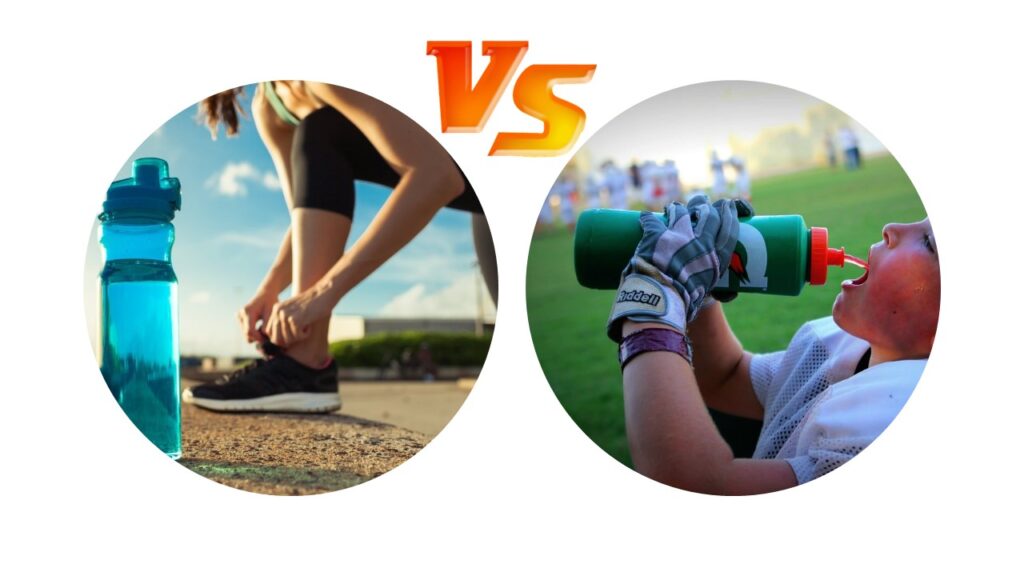
Sports Drinks Vs Water Hydration
Sports drinks and water are two common options for athletes looking to stay hydrated during physical activity. While both options can help replenish fluids lost through sweat and support overall health and performance, there are some key differences between sports drinks and water hydration.
Sports drinks are specifically designed to help athletes stay hydrated during intense exercise. They typically contain a combination of water, electrolytes (such as sodium and potassium), and carbohydrates (such as glucose and fructose).
Electrolytes help regulate fluid balance in the body and support muscle function, while carbohydrates provide quick energy during exercise.
In contrast, water is a calorie-free, sugar-free option for hydration that provides essential fluids to the body. It helps regulate body temperature, prevent dehydration, and support overall health and well-being. Here is a table that compares Sports Drinks Vs Water Hydration.
| Factors | Sports Drinks | Water |
| Composition | Contains electrolytes, carbohydrates, and sometimes vitamins and minerals | Pure, without added ingredients |
| Hydration efficiency | Quickly absorbed and provides faster hydration in case of electrolyte loss and dehydration | Slower rate of hydration compared to sports drinks |
| Energy provision | Provides quick energy due to the added carbohydrates | Does not provide energy |
| Calorie count | Contains calories, usually in the form of added sugar | Calorie-free |
| Taste | Generally more palatable than plain water due to added flavorings | May be less palatable to some athletes |
| Cost | Generally more expensive than water | Generally less expensive than sports drinks |
| Health concerns | Excessive intake can lead to increased calorie intake, tooth decay and obesity | No significant health concerns |
RELATED: 4 Ocean Water Bottles Review
What Sports Drinks Are And How They Work
Sports drinks are specially formulated beverages designed to help athletes stay hydrated during physical activity.
They typically contain a combination of water, electrolytes, and carbohydrates, which work together to provide the body with the fluids and nutrients needed for optimal performance.
Electrolytes, such as sodium, potassium, and magnesium, are essential for proper hydration because they help the body maintain fluid balance and regulate nerve and muscle function.
During exercise, the body can lose significant amounts of electrolytes through sweat, making it essential to replenish them through fluids.
Carbohydrates are also an important component of sports drinks, as they provide the body with the energy needed for physical activity.
During exercise, the body uses carbohydrates as its primary fuel source, and consuming carbohydrates during exercise can help delay fatigue and improve endurance.
Some sports drinks also contain other ingredients, such as vitamins and minerals, which can help support overall health and wellbeing.
When consumed, sports drinks are rapidly absorbed into the bloodstream, providing the body with the fluids, electrolytes, and carbohydrates needed to maintain hydration levels and sustain physical activity.
They are designed to be quickly and easily digested, making them a convenient option for athletes during exercise.
While sports drinks can be a beneficial hydration option for athletes, it’s important to note that not all sports drinks are created equal. Some sports drinks may contain high levels of sugar or artificial ingredients, which can negate the benefits of hydration and contribute to negative health outcomes.
As such, athletes should choose sports drinks that are low in sugar and contain natural ingredients whenever possible.
RELATED: Donner Lake Water Sports – Discover The Thrill of Donner Lake Water Sports
The Benefits And Drawbacks Of Sports Drinks
Sports drinks are a popular option for athletes to stay hydrated during intense exercise. They are designed to provide the body with fluids, electrolytes, and carbohydrates to support hydration and energy levels. However, there are both benefits and drawbacks to consuming sports drinks.
Benefits Of Sports Drinks
1. Replenish fluids and electrolytes: Sports drinks contain a balance of water and electrolytes like sodium and potassium, which are lost through sweat during exercise. Replenishing these fluids and electrolytes helps prevent dehydration and supports proper muscle function.
2. Provide quick energy: Sports drinks contain carbohydrates in the form of glucose, fructose, or sucrose. These carbohydrates provide quick energy during exercise, which can improve endurance and performance.
3. Improve absorption of fluids: The presence of carbohydrates and electrolytes in sports drinks helps the body absorb fluids more efficiently. This can help prevent fluid loss and improve overall hydration.
4. Taste and convenience: Sports drinks are available in a range of flavors and are easy to carry and consume during physical activity. The taste and convenience can make it easier for some athletes to stay hydrated during exercise.
Drawbacks Of Sports Drinks
1. High in sugar and calories: Sports drinks can be high in sugar and calories, which can contribute to weight gain and health problems like diabetes and tooth decay.
2. Expensive: Sports drinks can be more expensive than water, which can be a disadvantage for athletes on a tight budget.
3. Risk of overhydration: Overconsumption of sports drinks can lead to overhydration, which can cause a condition called hyponatremia. This condition occurs when the sodium levels in the blood become too low, which can be life-threatening.
4. Not necessary for all athletes: For some athletes, especially those engaging in moderate exercise or activities lasting less than an hour, water may be sufficient for hydration needs. In these cases, sports drinks may provide unnecessary calories and sugar.
The Benefits And Drawbacks Of Water (Sports Drinks Vs Water Hydration)
Water is an essential nutrient for the body and plays a critical role in regulating body temperature and supporting bodily functions.
For athletes, staying hydrated during physical activity is important for optimal performance and preventing dehydration. Here are some benefits and drawbacks of water as a hydration option:
Benefits Of Water
1. Essential hydration: Water is the most essential fluid for hydration and has no added sugars or calories. It is readily available and can be consumed by athletes of all ages and fitness levels.
2. Maintains body temperature: Water helps regulate body temperature by aiding in sweating, which is the body’s natural cooling mechanism. This helps prevent overheating during exercise.
3. Improves joint function: Adequate hydration can help lubricate the joints, which can improve flexibility and reduce the risk of injury.
4. Cost-effective: Water is a low-cost hydration option, making it accessible to athletes of all socioeconomic backgrounds.
RELATED: The Best Water Shoes That Are Safe For Your Feet And Durable
Drawbacks Of Water
1. Inadequate hydration: In certain situations, water may not provide sufficient hydration for athletes, particularly during intense or prolonged exercise. Inadequate hydration can lead to dehydration and impair performance.
2. Lack of electrolytes: While water is important for hydration, it lacks the electrolytes like sodium, potassium, and magnesium, which are lost through sweating and essential for muscle function. Some athletes may need to supplement their water intake with an electrolyte-rich drink like sports drinks.
3. Limited flavor options: Compared to sports drinks and other flavored beverages, water may be less appealing in terms of taste, which can make it less enticing for some athletes to consume.
Signs Of Dehydration
Dehydration occurs when your body loses more fluids than you take in. It can happen due to many reasons, including intense exercise, illness, or hot weather. Here are some common signs of dehydration to look out for:
1. Thirst: This is the most obvious sign of dehydration. When you are dehydrated, your body sends signals to your brain to drink more fluids.
2. Dry mouth and throat: If you feel like you have cotton in your mouth or your throat is dry, it may be a sign of dehydration.
3. Dark urine: Dehydration can cause your urine to become darker in color. Ideally, urine should be pale yellow or clear.
4. Fatigue and weakness: When you are dehydrated, your body has to work harder to function properly, which can lead to fatigue and weakness.
5. Headache: Dehydration can cause headaches or migraines, which may be worsened by physical activity.
6. Dizziness or lightheadedness: Dehydration can cause a drop in blood pressure, leading to dizziness or lightheadedness.
7. Muscle cramps: Dehydration can cause muscle cramps or spasms, especially during physical activity.
8. Dry or cool skin: When you are dehydrated, your body conserves water by reducing sweat production, which can cause your skin to become dry or cool to the touch.
If you experience any of these signs of dehydration, it’s important to drink fluids immediately. In serious cases, dehydration can lead to serious complications, such as heat exhaustion or heatstroke.
It’s important to stay hydrated before, during, and after physical activity to prevent dehydration and support overall health and performance.
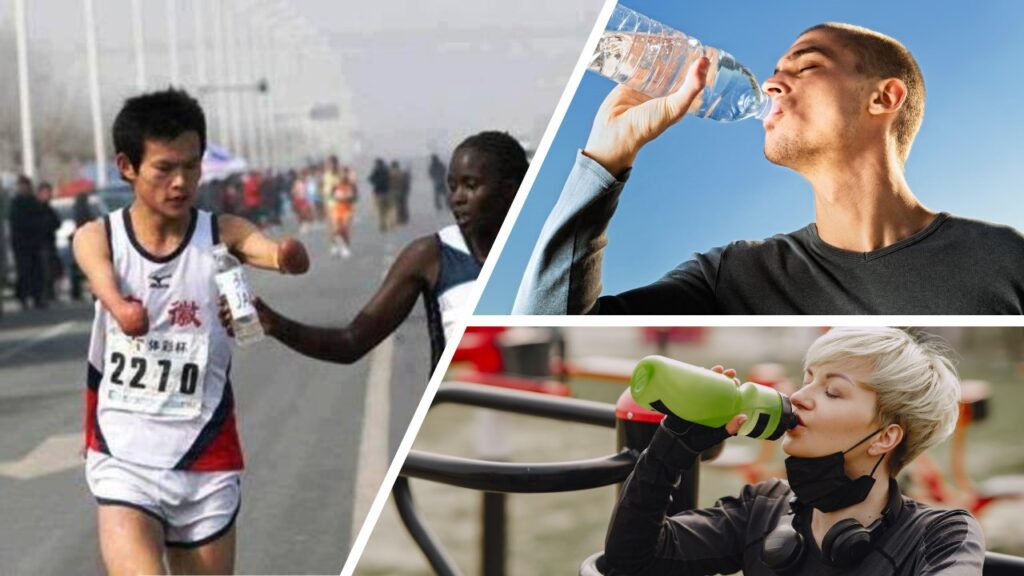
The Benefits Of Staying Hydrated During Physical Activity
Staying hydrated during physical activity is essential for a number of reasons. When the body is dehydrated, it can experience a range of negative effects, including decreased energy levels, muscle cramps, and impaired cognitive function.
In extreme cases, dehydration can even lead to heat exhaustion or heat stroke, which can be life-threatening.
ALSO READ: Are Water Bottles Allowed On Planes? The Definitive Answer and Essential Tips for Travelers
On the other hand, proper hydration has numerous benefits for athletes, including improved physical performance, increased endurance, and reduced risk of injury. Here are some of the key benefits of staying hydrated during exercise:
1. Improved Physical Performance
Proper hydration can help improve physical performance by reducing fatigue, improving reaction time, and increasing muscle strength and power. When the body is dehydrated, it has to work harder to perform the same tasks, leading to decreased efficiency and effectiveness.
2. Increased Endurance
Adequate hydration is essential for endurance athletes, such as long-distance runners or cyclists, who may need to stay hydrated for several hours at a time. When the body is properly hydrated, it can maintain the energy levels needed to sustain physical activity over longer periods of time.
3. Reduced Risk Of Injury
Dehydration can increase the risk of injury by causing muscle cramps, dizziness, and decreased cognitive function. Proper hydration can help prevent these negative effects and reduce the risk of injury during physical activity.
4. Improved Recovery
Staying hydrated after exercise can help speed up recovery time by flushing out toxins and reducing inflammation. This can help reduce soreness and fatigue, allowing athletes to train harder and more effectively.
5. Temperature Regulation
Water helps regulate body temperature by dissipating heat through sweating and maintaining a stable internal temperature. This is crucial for preventing heat-related illnesses.
6. Cognitive Function
Dehydration can impair cognitive function, including memory, concentration, and alertness. Staying hydrated can help you think more clearly and stay focused.
7. Digestive Health
Adequate hydration is necessary for the proper functioning of the digestive system. It helps in the digestion and absorption of food, as well as the prevention of constipation.
8. Joint Lubrication
Water is a component of synovial fluid, which lubricates the joints. Proper hydration can reduce the risk of joint pain and stiffness.
9. Skin Health
Hydrated skin looks healthier and is more resilient. It can help prevent dryness, flakiness, and premature aging.
10. Detoxification
Water plays a crucial role in eliminating waste products and toxins from the body through urine and sweat. It supports the functioning of the kidneys and liver.
11. Weight Management
Staying hydrated can help control appetite and reduce the likelihood of overeating. Sometimes, the body can confuse thirst with hunger.
12. Heart Health
Adequate hydration maintains blood volume, which is essential for maintaining blood pressure within a healthy range. Chronic dehydration can strain the heart.
13. Immune Function
Proper hydration supports the immune system by ensuring that immune cells are transported effectively throughout the body.
14. Headache Prevention
Dehydration is a common cause of headaches and migraines. Drinking enough water can help prevent or alleviate these symptoms.
15. Improved Mood
Being well-hydrated can positively impact mood and reduce the risk of irritability and mood swings associated with dehydration.
16. Kidney Function
Adequate water intake supports the kidneys in filtering waste and excess substances from the bloodstream.
17. Balanced Electrolytes
Proper hydration helps maintain the balance of electrolytes (sodium, potassium, magnesium, etc.) in the body, which is crucial for various physiological processes.
18. Preventing Heat-Related Illness
In hot weather or during strenuous activities, staying hydrated is essential to prevent conditions like heat exhaustion and heat stroke.
It’s important to note that individual hydration needs can vary based on factors such as age, sex, activity level, and climate. The “8×8” rule, which suggests drinking eight 8-ounce glasses of water a day, is a general guideline, but some individuals may need more or less.
Listening to your body’s signals of thirst and monitoring the color of your urine (pale yellow is usually a good sign) can help you gauge your hydration needs more accurately.
RELATED: Best Sports Water Bottles – Perfect For Everyone
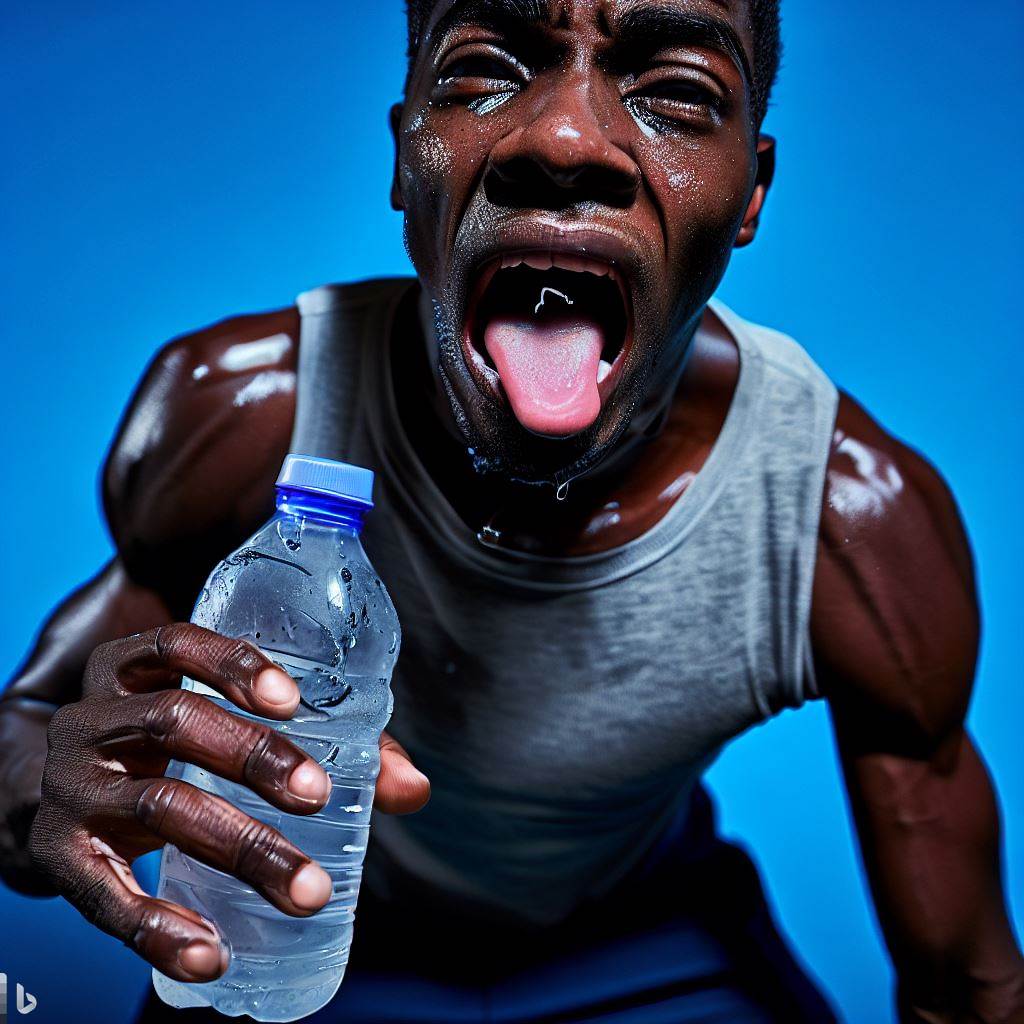
Understanding Dehydration
Understanding dehydration is crucial because it’s a condition that occurs when your body loses more fluids than it takes in, leading to an insufficient amount of water to carry out normal bodily functions.
Dehydration can range from mild to severe and can have significant health consequences. Here’s a deeper look into understanding dehydration:
Causes of Dehydration
- Inadequate Fluid Intake: One of the primary causes of dehydration is simply not drinking enough fluids, especially in hot weather or during physical activity.
- Excessive Fluid Loss: Dehydration can occur due to excessive sweating, vomiting, diarrhea, or urination, which results in a loss of fluids and electrolytes.
- Illness: Certain illnesses, such as fever or infections, can increase the body’s fluid requirements and lead to dehydration.
- Medications: Some medications, like diuretics or certain blood pressure medications, can increase urine output and contribute to dehydration.
- Medical Conditions: Chronic conditions like diabetes or kidney disease can affect the body’s ability to regulate fluid balance, making individuals more susceptible to dehydration.
Consequences of Dehydration
Dehydration can have serious health consequences, including:
- Heat-Related Illnesses: In hot weather or during strenuous physical activity, dehydration can lead to heat exhaustion or heat stroke, which can be life-threatening.
- Kidney Stones: Dehydration increases the risk of developing kidney stones by allowing minerals and salts to concentrate in the urine.
- Urinary Tract Infections: Dehydration can lead to urinary tract infections by reducing the body’s ability to flush out bacteria from the urinary tract.
- Low Blood Pressure: Dehydration can cause a drop in blood pressure, leading to dizziness, fainting, or even shock in severe cases.
- Electrolyte Imbalances: Dehydration can disrupt the balance of electrolytes (sodium, potassium, magnesium, etc.) in the body, which can affect various bodily functions.
Preventing Dehydration
To prevent dehydration:
- Drink an adequate amount of water throughout the day and increase your intake during hot weather or when physically active.
- Be mindful of fluid losses during illness and make an effort to drink more fluids.
- Monitor urine color; pale yellow is a good indicator of proper hydration.
- Avoid excessive caffeine or alcohol consumption, as they can contribute to dehydration.
- Eat water-rich foods like fruits and vegetables.
Treatment of Dehydration
Mild dehydration can often be treated by drinking fluids, especially water or oral rehydration solutions. Severe dehydration may require medical attention, including intravenous (IV) fluids.
Understanding dehydration and its potential consequences is essential for maintaining good health. It’s important to recognize the signs of dehydration and take steps to prevent it, especially in situations where the risk is higher, such as during hot weather or illness.
Is Water Or Sports Drinks Better For Hydration
Choosing between sports drinks and water for hydration can be a difficult decision for athletes.
However, by considering a few key factors, athletes can make an informed decision about which option is best for them. Here are some tips for athletes on how to choose between sports drinks and water for hydration:
1. Consider The Intensity And Duration Of Your Workout
If you are engaging in prolonged or intense exercise, such as a long-distance run or a high-intensity interval workout, you may benefit from the electrolytes and carbohydrates found in sports drinks. However, if your workout is shorter or less intense, water may be sufficient for hydration.
2. Consider Your Individual Needs And Preferences
Everyone has unique hydration needs and preferences, and what works for one athlete may not work for another.
Some athletes may find sports drinks more palatable and easier to consume during exercise, while others may prefer the taste of water. Consider your individual preferences and adjust your hydration strategy accordingly.
3. Consider Any Pre-Existing Health Conditions
Some athletes may have pre-existing health conditions that can impact their hydration needs. For example, athletes with diabetes may need to monitor their sugar intake carefully and may benefit from low-sugar sports drinks or water instead.
Athletes with kidney or heart disease may need to limit their fluid intake and should consult with a healthcare professional before developing a hydration strategy.
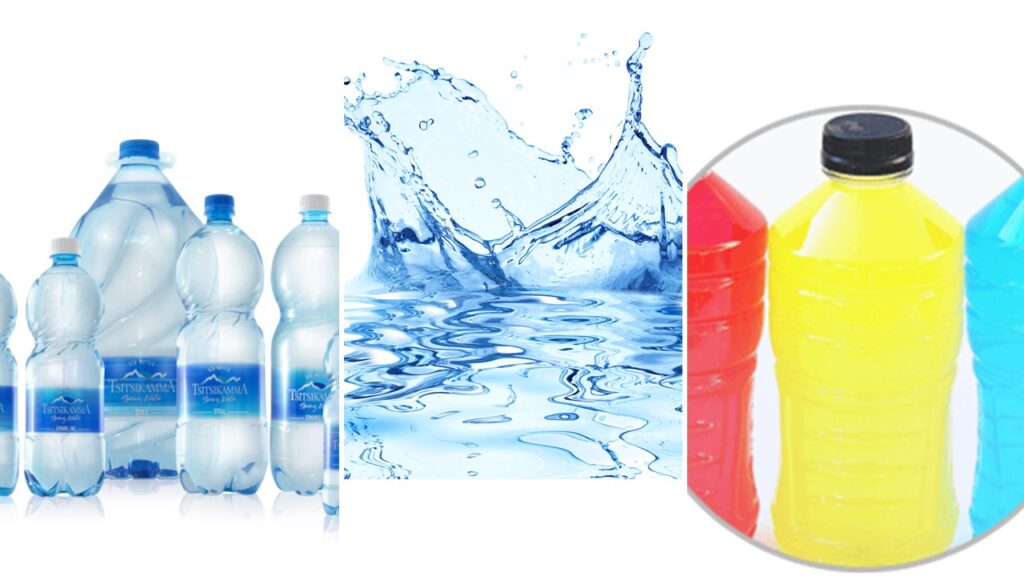
Why Is Water Better Than Sports Drinks
Water is often considered a better option than sports drinks for hydration in many situations. Here are some reasons why:
1. No Added Sugar: Sports drinks often contain high amounts of added sugars, which can contribute to weight gain, tooth decay, and other health issues. Water, on the other hand, contains no added sugars, making it a healthier choice for hydration.
2. Lower Cost: Water is generally more affordable than sports drinks, which can be expensive, especially if you consume them frequently. By choosing water for hydration, you can save money while still meeting your hydration needs.
3. Suitable for Most Activities: For most recreational activities and moderate exercise, water is generally sufficient for hydration. Sports drinks are designed for intense, prolonged exercise and may not be necessary for most people’s workouts.
4. No Unnecessary Ingredients: Sports drinks often contain other ingredients besides water, such as electrolytes and carbohydrates. While these ingredients can be beneficial during intense exercise, they may not be necessary for most people’s workouts. Drinking water provides pure, simple hydration without any added ingredients.
5. No Risk of Overhydration: Overhydration, or drinking too much fluid, can be a risk with sports drinks, as they may encourage you to consume more fluid than your body needs. Drinking water, on the other hand, is less likely to lead to overhydration.
While sports drinks can be beneficial for athletes during intense, prolonged exercise, for most people, water is a better option for hydration due to its simplicity, affordability, and lack of added sugars and unnecessary ingredients.
4. Experiment With Different Options
The best way to determine which hydration strategy works best for you is to experiment with different options. Try drinking water during one workout and a sports drink during another and see how you feel. Pay attention to how your body responds to different hydration strategies and adjust accordingly.
RELATED: DOUSSPRT Men’s Water Shoes Quick Drying Sports Aqua Shoes
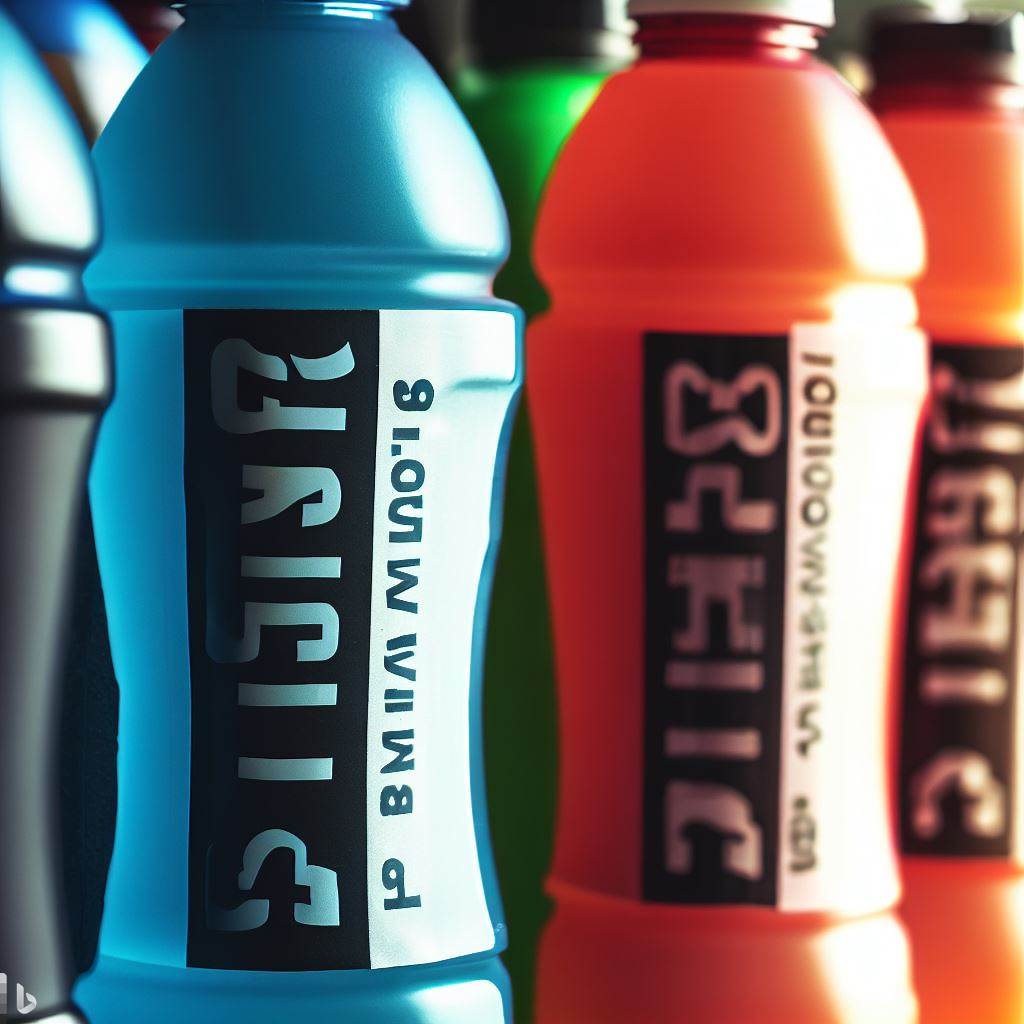
When to Choose Sports Drinks
Sports drinks can be beneficial in specific situations, but they are not necessary for everyday hydration. Here are some scenarios when choosing sports drinks over water or other beverages might be appropriate:
1. Prolonged or Intense Exercise
Sports drinks can be beneficial during extended periods of intense physical activity lasting more than an hour, such as endurance running, cycling, or high-intensity team sports like soccer or basketball.
These beverages provide a source of carbohydrates and electrolytes (e.g., sodium, potassium) that can help maintain energy levels and electrolyte balance during prolonged exercise.
2. Excessive Sweating
If you’re sweating profusely due to hot and humid conditions or heavy physical exertion, you may lose a significant amount of electrolytes through sweat. In such cases, sports drinks can help replace the lost electrolytes and fluids more effectively than water alone.
3. Recovery After Strenuous Exercise
After an intense workout or competition, your body may benefit from a sports drink to help replenish glycogen stores and electrolytes more rapidly than water. The carbohydrates in sports drinks can assist in refueling tired muscles.
4. Preventing Hyponatremia
In rare cases, individuals who consume excessive amounts of plain water during prolonged exercise can dilute their blood sodium levels, leading to a condition called hyponatremia. Sports drinks with sodium can help prevent this condition by providing some sodium intake.
5. Heat-Related Illness Prevention
In hot weather or during extended exposure to high temperatures, sports drinks can help prevent heat-related illnesses like heat exhaustion or heat stroke by assisting with temperature regulation and electrolyte balance.
6. Endurance Events
Athletes participating in marathons, triathlons, or other long-duration endurance events often use sports drinks strategically to maintain energy and hydration levels throughout the competition.
7. Individual Preferences
Some people simply prefer the taste of sports drinks over water, which can encourage them to stay hydrated, particularly in situations where they might be tempted to drink sugary sodas or other less healthy beverages.
It’s important to note that for most individuals engaged in moderate-intensity physical activity or everyday activities, water is usually sufficient to meet their hydration needs. Sports drinks are not recommended for casual or recreational activities due to their sugar content.
Additionally, excessive consumption of sports drinks can contribute to excessive calorie intake and may lead to weight gain and dental issues.
When choosing a sports drink, look for options with lower sugar content and avoid those with excessive added sugars or artificial ingredients.
Always read the label and consider consulting with a healthcare or sports nutrition professional to determine your specific hydration needs based on your activity level and individual factors.
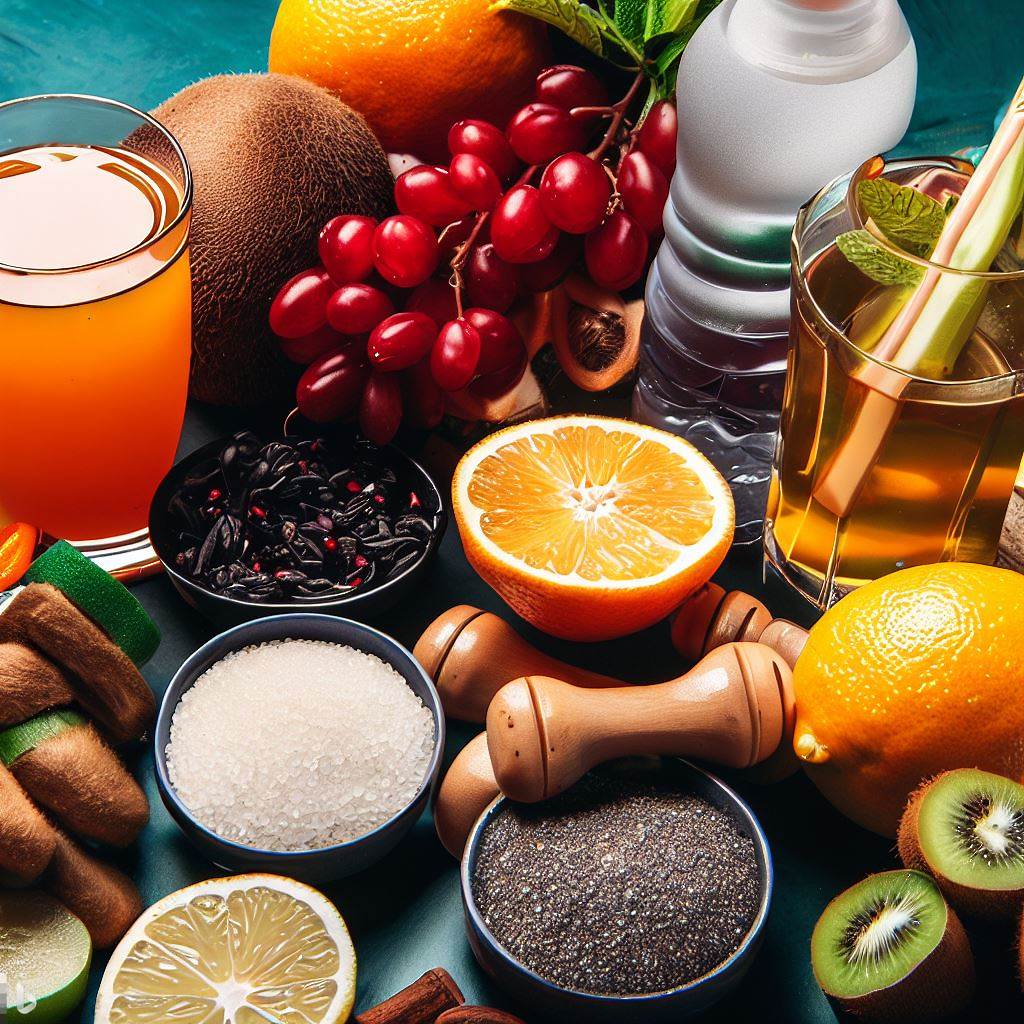
Sports Drinks Ingredients and Varieties
Sports drinks are designed to provide hydration, replenish electrolytes, and supply carbohydrates to support physical performance during exercise.
These beverages typically contain a combination of ingredients that serve these purposes. Here are some common ingredients found in sports drinks and a discussion of the various varieties available:
Common Ingredients in Sports Drinks
- Water: Water is the primary component of sports drinks, serving as the hydration base.
- Carbohydrates: Sports drinks contain carbohydrates in the form of sugars (e.g., sucrose, glucose, fructose) or carbohydrates derived from maltodextrin. These carbohydrates provide a source of energy during physical activity.
- Caffeine: A stimulant that can enhance alertness, endurance and performance. This may not be in all sports drinks but may be available in other sports drinks.
- Electrolytes: Electrolytes like sodium, potassium, calcium, and magnesium are added to sports drinks to help replace those lost through sweating. Electrolytes are essential for maintaining proper muscle function and preventing dehydration.
- Acidulants: Citric acid, tartaric acid, or other acidulants are used to give sports drinks a tart or tangy flavor and to improve their shelf life.
- Flavorings: Natural or artificial flavorings are added to enhance the taste of sports drinks, making them more palatable during exercise.
- Preservatives: Some sports drinks may contain preservatives to extend their shelf life. Common preservatives include sodium benzoate and potassium sorbate.
- Coloring Agents: Food colorings are used to give sports drinks their characteristic colors.
- Sweeteners: Sports drinks may contain sweeteners like high-fructose corn syrup, sucrose, glucose, or artificial sweeteners like sucralose and aspartame.
- Vitamins and Minerals: Some sports drinks are fortified with vitamins and minerals, such as vitamin C or B-complex vitamins, to provide additional nutritional benefits.
Varieties of Sports Drinks
1. Isotonic Sports Drinks
These are the most common type of sports drinks and are formulated to have a similar osmolarity (concentration of solutes) as bodily fluids. They are designed for rapid absorption and are typically recommended for activities lasting around an hour. Examples include Gatorade and Powerade.
2. Hypotonic Sports Drinks
These sports drinks have a lower osmolarity than bodily fluids and are designed for faster fluid absorption. They contain fewer carbohydrates and are often recommended for short-duration, high-intensity activities. Hypotonic sports drinks may not provide as much energy as isotonic varieties.
3. Hypertonic Sports Drinks
These drinks have a higher osmolarity than bodily fluids and are formulated with a higher carbohydrate concentration. They are not typically used for hydration during exercise but rather as a post-exercise recovery beverage to replenish glycogen stores.
4. Electrolyte Tablets or Powders
Some athletes prefer to use electrolyte tablets or powders that can be added to water to customize the electrolyte content and flavor according to their specific needs. These are often used for longer endurance events.
5. Natural and Low-Sugar Options
In response to concerns about added sugars, artificial additives, and artificial colors, some sports drink brands offer natural or low-sugar options that use alternative sweeteners and natural flavors.
When choosing a sports drink, consider the duration and intensity of your activity, as well as your personal preferences and dietary goals. It’s essential to read the label to understand the specific composition of the drink and select one that aligns with your hydration and performance needs.
For shorter, less intense activities, water may be sufficient, while sports drinks are more appropriate for prolonged or intense exercise sessions.
Hydration Strategies (Sports Drinks Vs Water Hydration)
Developing a personalized hydration strategy is essential for athletes to optimize their performance and prevent dehydration. Here are some tips for you to create a hydration plan that suits your needs:
1. Determine individual fluid requirements: It is important that you calculate your fluid requirements based on your body weight, workout duration, and intensity. This will help you determine how much fluid you need to consume before, during, and after exercise.
2. Monitor hydration status: Monitor your hydration status by checking your urine color, thirst level, and body weight before and after exercise. This will help you determine if you are adequately hydrated and adjust your fluid intake accordingly.
3. Experiment with different fluids: You need to experiment with different fluids to determine what works best for you. Some athletes may prefer sports drinks, while others may prefer water or other beverages.
4. Consider electrolyte intake: You should consider your electrolyte intake when developing your hydration strategy. For prolonged exercise or during high-intensity workouts, electrolyte replacement drinks may be beneficial.
5. Develop a hydration schedule: You should develop a hydration schedule that outlines when and how much fluid you should consume before, during, and after exercise. This will help you stay on track with your hydration goals.
6. Be aware of environmental factors: It is essential that you are aware of environmental factors that may impact your fluid needs, such as high temperatures, humidity, or altitude. These factors may increase fluid requirements and require adjustments to your hydration plan.
7. Seek professional advice: If you have specific health concerns or participating in high-level competition, you should seek professional advice from a sports nutritionist or medical professional. They can help you develop a personalized hydration plan that meets your specific needs and goals.
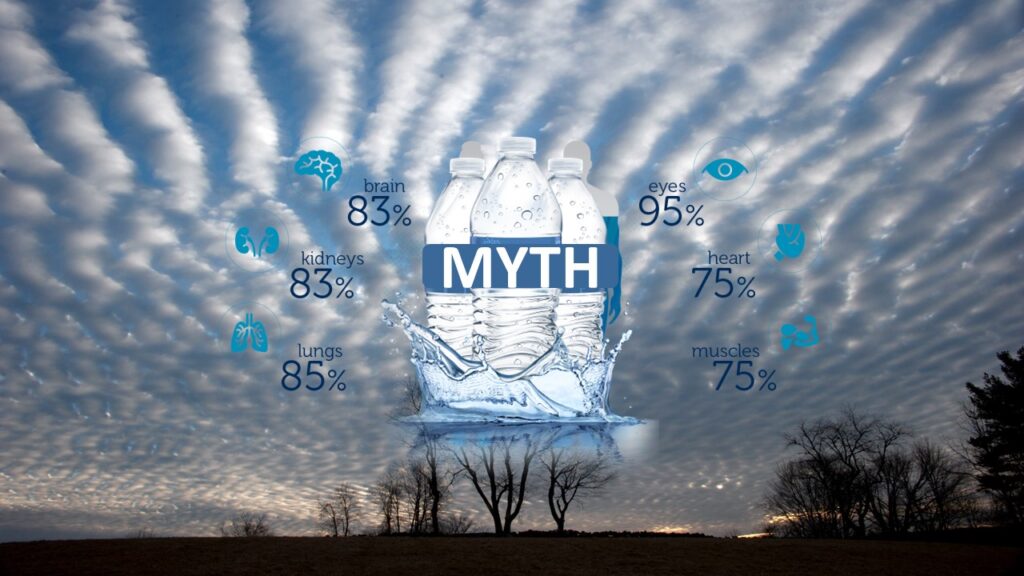
Myths About Hydration
There are many myths about hydration and you should not be deceived by any myth. Here are some common misconceptions about hydration and the facts that debunk them:
Myth #1: Drinking Too Much Water Can Lead To Hyponatremia
Fact: While it is true that hyponatremia can occur when electrolyte levels become too diluted, it is rare and usually only happens when athletes drink excessively large amounts of water without replenishing their electrolyte levels.
For most athletes, drinking enough water to meet their fluid needs is not likely to cause hyponatremia.
Myth #2: Thirst Is Not A Reliable Indicator Of Dehydration
Fact: Thirst is actually a very reliable indicator of dehydration. When the body is dehydrated, the thirst mechanism is activated to encourage fluid consumption. you should not ignore your thirst cues and should drink fluids when you feel thirsty.
Myth #3: Caffeine Dehydrates The Body
Fact: While caffeine is a diuretic, which means it can increase urine production, moderate caffeine intake does not cause significant dehydration in healthy individuals. In fact, caffeinated beverages can contribute to fluid intake and hydration when consumed in moderation.
Myth #4: Sports Drinks Are Always A Better Choice Than Water For Hydration
Fact: Sports drinks are designed to provide quick hydration and energy during intense workouts, but they also contain added sugars and calories. For most athletes, water is a better choice for hydration, especially during low to moderate intensity exercise.
Myth #5: Drinking More Water Than You Need Will Flush Out Toxins
Fact: While water is important for flushing toxins out of the body, drinking more water than you need will not provide any additional benefit. In fact, excessive water intake can lead to overhydration and potentially harmful electrolyte imbalances.
RELATED: Thrilling West Palm Beach Water Sports Activities That Will Leave You Breathless
The Bottom Line
When it comes to Sports Drinks Vs Water Hydration, proper hydration is essential for optimal athletic performance, and choosing the right hydration strategy can make a significant difference. While sports drinks can be helpful for intense, prolonged exercise, for most people, water is a better and healthier option due to its simplicity, affordability, and lack of added sugars and unnecessary ingredients.
You should develop a personalized hydration strategy based on your individual needs and preferences and consider factors such as the intensity and duration of your workout. By staying properly hydrated you can improve your performance, reduce the risk of injury, and enjoy the many benefits of regular exercise.
